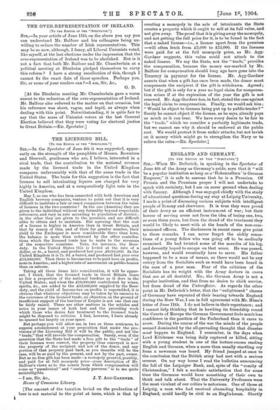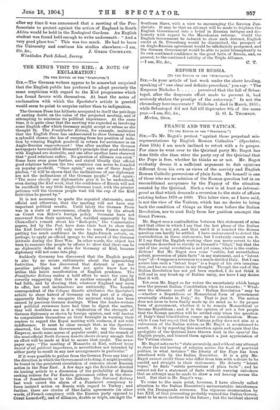ENGLAND AND GERMANY.
[To THE EDEFOR OF TIIE sescrAroa.1 Sut,—When Mr. Delbriick, in speaking in the Spectator of June 4th of the Army as Germany's pride, says that it "will be a popular institution so long as a 'Hohenzollern' is German Emperor," it is safe to assume that he is a Prussian. Of Prussia and the Prussians proper I will not undertake to speak with certainty, but I am on surer ground when dealing with Saxony. Although I was engaged chiefly with the study of educational questions during my stay at Leipzig University, I Made a point of discussing various. subjects with intelligent people of Saxony and elsewhere. It is true they were proud of their Army as an efficient instrument of war; but their horror of serving arose not from the idea of losing one, two, or even three years, but from the dread of the treatment they would be likely to meet with at the hands of the non-com- missioned officers. The disclosures in recent cases give point to these remarks. I can never forget the sickly sensa- tions of a young fellow who was going off to be medically examined. He had twisted some of the muscles of his leg, and devoutly hoped to escape on that score. He was passed, however, and would eventually have to serve. His father happened to be a man of means, so there would not be any outcry from the Socialists such as would have been heard in the case of a poor man. Fear of the criticism of the Socialists has its weight with the Army doctors in cases that are at all doubtful. •No; the German Army is not a popular institution, and that from no desire to shirk service, but from dread of the Unteroffizier. As regards the other point in Mr. Delbriick's letter, that the " enlightened " classes of Germany have repented of their bearing to•wards England during the Boer War,1 am in full agreement with Mr. Rime's letter of June 11th. I do not believe in their repentance ; and I cannot help thinking that in hawking its friendship round the Courts of Europe the German Government feels much less confidence in the position of the Fatherland than it cares to avow. During the course of the war the minds of the people seemed dominated by the all-pervading thought that disaster must happen to England: I remember, in the 'days when Lord Kitchener was being daily captured or killed, sitting with a young student in one of the lecture-rooms reading English and German, when a more than usually startling cry from a newsman was beard. My friend jumped at once to the conclusion that the British army had met with a serious reverse. On my way home I read the bulletins announcing the fall of the Leipziger Bank, and, spite of the "comity of Christendom," I -felt a sardonic satisfaction that -for -some time the Germans would have something of their own to think and talk about. That the University Professors were the most virulent of our critics is notorious. One of those at Leipzig, a man who had received abounding hospitality in England; could 'hardly be Civil to- anEligliabman. Shortly after my time it was announced that a meeting of the Pro- fessoriate to protest against the action of England in South Africa would be held in the Zoological Gardens. An English student was found bold enough to write underneath : "And a very good place too." This was too much. He had to leave the University and continue his studies elsewhere.—I am, Sir, &c., J. GREW COCHRANE. Wimbledon Park School, Surrey.







































 Previous page
Previous page